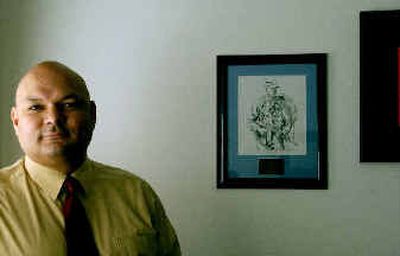Kootenai County has new veterans service officer

Three 7.62 mm slugs from a North Vietnamese machine gun ripped through Grady Myers on March 5, 1969. Thirty-five years later, a pin holds his left shoulder together, he drags his right foot because the tendon connecting it to his leg was severed, and a bullet remains lodged in his back.
Beginning with that trauma, Myers’ health has deteriorated over the years. At age 55, he suffers from asthma and diabetes and is no longer able to live on his own or work as an illustrator for the Idaho Panhandle National Forests, his job since 1991. So, he’s being processed for a medical retirement.
Myers is divorced, his kids live in Portland, and the health insurance that’s been paying for his three-month stay at the LaCrosse Health and Rehabilitation Center in Coeur d’Alene is running out.
Where can he turn?
Kootenai County’s new veterans service officer, Darryl Heisey, has some answers for him.
“When I learned about Grady from a vet who knows him, I dropped everything and visited him in LaCrosse. He told me his kids are working with the Portland VSO and the Veterans Administration to increase his disability from 60 to 100 percent. I also found he’d like to live near them.
“So, I called my Portland counterpart to make sure he was filling out the correct forms, then went to my computer, searched, and found veterans’ homes in Idaho, Oregon and Washington that would accept him.
“I’ll stay on top of Grady’s situation to make sure he gets what he’s entitled to,” Heisey says.
That’s the kind of problem the 40-year-old retired Army sergeant first class deals with daily. According to office records, in his first 21 days of serving Kootenai County’s 13,126 military veterans, Heisey has visited with 53 of them, helped 98, and filled in 134 VA forms.
He’s also picked up useful tips during visits with veterans’ state service officer Ben Keeley in Lewiston and Sandpoint VSO Don Carr.
Heisey’s 20-year career as a chaplain’s assistant was good training for his current job, he says. “It was all about helping people. Also, as I gained seniority, I got immersed in bureaucracy, and that’s what I deal with on a daily basis.”
Heisey’s mother, a native of Guam, married his sailor father when he was stationed on that South Pacific island. Darryl spent his first 13 years on Guam, where his father taught after his discharge from the Navy.
He enlisted in the Army after graduating from high school in Tucson, Ariz., then served at bases in Louisiana, Alaska, Colorado, New Jersey, South Carolina and Hawaii, with temporary assignments in Europe and Japan.
Following his discharge two years ago, Heisey moved his family to North Idaho to savor the outdoor life and be near his wife Anna’s parents in Blanchard and her brother in Athol.
Two of his children, Caitlyn, 19, and Sara, 18, are Lake City High graduates. Olivia, 9 and Joshua, 6, are home-schoolers.
For the past two years, Heisey was loss-prevention manager for the Coeur d’Alene Sears store. He learned about his current job, which he calls a “perfect fit,” from the Job Service’s veterans’ representative. It had been vacant since Mikal Thornton, the previous VSO, resigned in May to take another position in Washington, D.C.
Heisey, whose $30,000 salary is paid by the county, says he’s been able to help several vets in immediate need of cash for emergencies, such as to pay electric bills or buy gas to search for work.
The Kootenai Veterans Council, composed of representatives of all the veteran-related organizations in the county, plus several private businesses, provides him funds that he can disburse as one-time emergency grants of up to $35.
But his principal role, he says, is to serve as a conduit to the VA.
“We have computer programs that include all the forms needed to process claims,” Heisey says. “We can fill them out a whole lot faster than a vet can do it for himself, especially since we know some specific verbiage that can expedite a claim.
“The process can be overwhelming, especially for older vets who might not be comfortable on a computer.”
He says his office functions as a one-stop shop, tying together medical records held in the Spokane VA hospital with administrative records maintained in the agency’s Boise office.
According to Heisey, some vets, especially those who grew up in the Depression, then fought in World War II, are reluctant to ask for help.
“They’ve always worked, and many are proud that they’ve never accepted help of any kind. It’s tough to persuade them that government assistance is available for them because of their service to our country.”
Heisey is developing a newsletter that he intends to send to local veterans’ organizations. “But I recognize that many vets don’t belong,” he says. “So, I’d ask any veteran who has questions about entitlements or who wants to submit a claim to the VA to call. The sooner forms are submitted, the quicker they’ll be processed.”